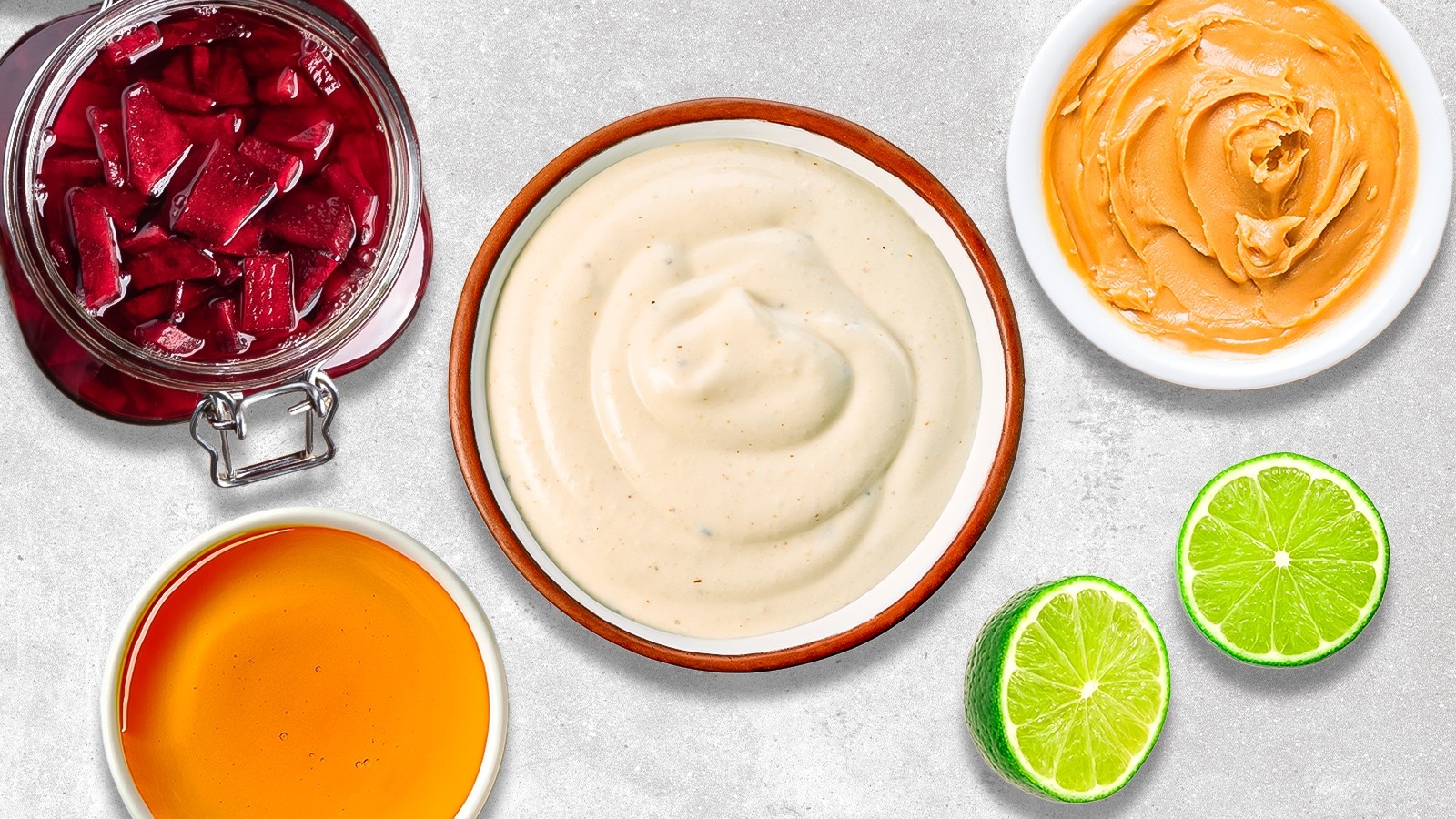Yogurt is a magical dairy product used in cuisines from all over the globe. From desserts and snacks to meat marinades, there are a plethora of ways to use yogurt and add flavor to it. With several types of yogurt on the market, consumers are given versatility in taste and usage. There’s non-fat, low-fat, full-fat, Greek yogurt, cow milk, goat milk, and so many more.
In addition to its range of options, ways to flavor it, and varying usage, yogurt supposedly comes with nutritional benefits: One cup of plain low-fat yogurt has protein, fat, carbohydrates, sugar, calcium, magnesium, potassium, vitamin A, folate, and more. They have different consistencies and assorted flavor profiles, but no matter which one you end up purchasing, you might feel inclined to jazz it up a bit. Whether you want to color your yogurt naturally with beets or sweeten it with your favorite sauce, there are loads of creative ways to add more flavor to yogurt. Find inspiration from this list for your next meal or snack.
1. Squeeze in some citrus juice

The acidity and zest of citrus fruits can augment the flavor of your yogurt by giving it a refreshing tang. Squeeze citrus in any yogurt — whether Greek, skyr, or anything in between. Try it with lemon, lime, orange, grapefruit, or another citrus. The acidity can cut through the creaminess of the yogurt to balance the taste. For best results, squeeze it by hand or with a juice squeezer, but packaged lemon or lime juice are options, too. While you’re at it, drop in some of the zest for additional flavor and some texture.
For a sweeter addition to your breakfast yogurt, use tangerine juice. It’s up to you how much juice you want to put in. Be frugal with the juice when you want just a hint of citrus, but if you wish to intensify the taste, the more, the merrier. If you’d like to switch up the flavor of Greek yogurt in particular, you might want to try a hint of lemon. This addition can give Greek yogurt a sour cream taste. Greek yogurt tends to be sour and thicker than regular yogurt, so the lemon intensifies the flavor. Use a little bit of lemon at a time until you get the desired taste. You can always add more, but you can’t take it away.
2. Sprinkle in fresh or dried herbs
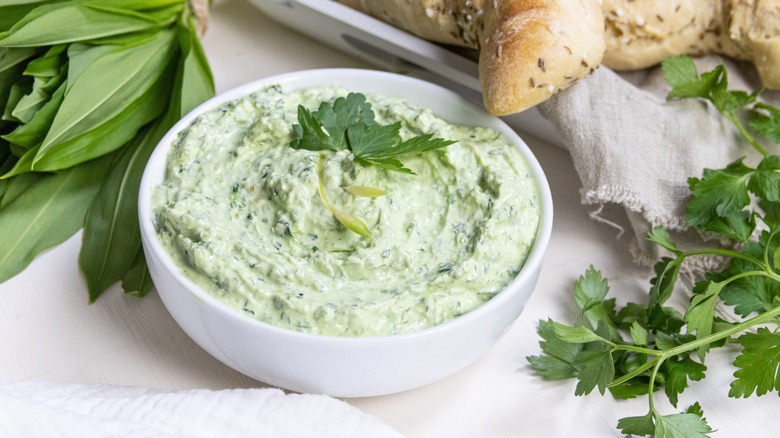
Introduce a new flavor profile to plain yogurt with fresh or dried herbs, such as mint, basil, or thyme. Choose the herbs depending on what you will use the yogurt for. If it’s a side dip for a grilled chicken seasoned with basil and parsley, use similar herbs in your yogurt. The ingredients will brighten the flavor and create a complementary pairing, such as a dill and garlic yogurt spread on salmon or a mint yogurt with lamb. Need a couple more ideas? Make a lamb burger with herbed Greek yogurt with lemon zest, oregano, cilantro, mint, and parsley. For something cozy, try a bowl of hearty lentil soup topped with herbed yogurt seasoned with tarragon, parsley, lemon zest, salt, and pepper.
As a tip, it’s important to finely chop the herbs so they get evenly spread throughout the yogurt. Fresh greens tend to come with moisture and can often clump together, so make sure to give them a good chop. They also provide an aromatic component to the yogurt, creating a side dish or an accompaniment to protein. It’s an added benefit that yogurt makes a protein-rich side, snack, or marinade.
3. Bring on the beets
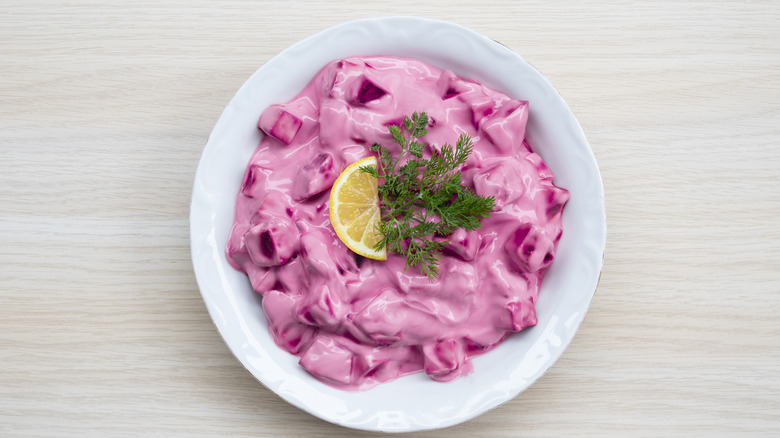
Give your yogurt an alluring burst of color with fresh beets. Beets and yogurt transcend many cultures, but in Persian culture, chopped beets are often added to yogurt and eaten as a snack or on the side of a meal. Pink yogurt is fun for most ages, so children often find it an enticing snack. The beets provide an earthy and sweet flavor, given that you cook them ahead of time. Roasting, boiling, or any other form of cooking beets will cut through the earthiness and intensify the sweet notes.
To go the extra mile, cool the beets and blend them into the yogurt to achieve a smooth consistency. The natural sugars from the beets work with the tanginess of yogurt. Beets are a good source of folate, manganese, vitamin A, vitamin C, and potassium to potentially give your yogurt a nutritional boost. You don’t have to stick with the red-purple beets, either. Try white or golden beets for a different color or pickled beets to amp up the flavor of yogurt.
4. Give spices a whirl

Kajakiki/Getty Images
When you’re at a loss for enriching the taste of your yogurt, spices can be the simplest method to do so. Plus, it’s a good option if you’re looking for a way that doesn’t add even more sugar. You likely have at least one spice, if not multiple, in your cabinet. Go for a classic cinnamon yogurt, or give it more depth with additional spices.
For example, ginger transforms yogurt with minimal effort while making it a scrumptious and aromatic breakfast. Other warming spices like cinnamon, clove, cardamom, and star anise would make a comforting treat for the cooler months. Speaking of chilly weather, when fall rolls around, you can enjoy pumpkin-flavored yogurt using freshly ground pumpkin pie spice or a premade one left over from last Thanksgiving.
Whatever you use, you can even toast your spices in a pan to enhance the flavor and aroma.
5. Sweeten the yogurt deal with sugar, honey, or maple syrup
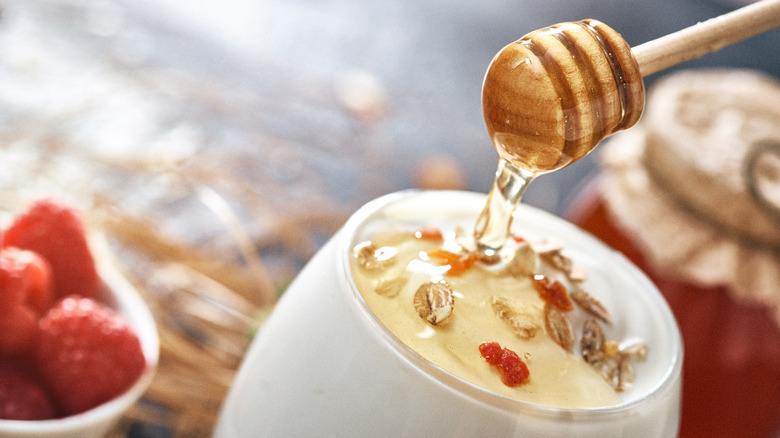
When working with unsweetened yogurt, you might want to give it a sugary boost. This is particularly convenient because you get to customize the sweetness. A lot of sweetened yogurts are loaded with added sugar, and you don’t get a say in how much. When you do it yourself, you can call the shots on the amount and type of sweeteners. Many kinds of sweeteners can provide a palatable flavor and offer differing results. Consider some of these best sweeteners that aren’t sugar if you need some ideas.
Coconut sugar doesn’t taste like coconut and instead has the taste of mild caramel to give yogurt a lift in sweetness and flavor. Molasses is thick and has a vanilla caramel note that would be tasty when drizzled over yogurt with fruit. Honey comes in different options, from wildflower to orange blossom. Maple syrup has a comforting taste that can cut through the yogurt.
Simply drizzle your sweetener on top of the yogurt for a beautiful swirl or mix it thoroughly for balanced sweetness throughout. Try monk fruit or stevia as naturally occurring zero-calorie sweeteners.
6. Add a hint of cream cheese
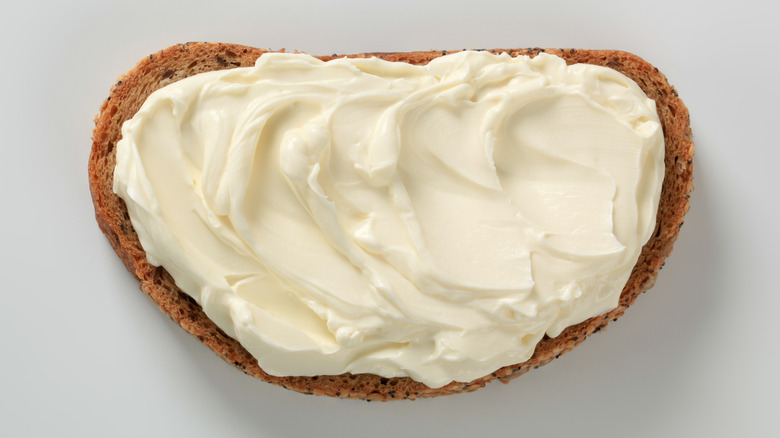
While adding cream cheese to yogurt might sound a little odd, it makes sense when you think about it. They’re both dairy-based, and they both have a bit of a tang to them. The cream cheese can make your yogurt lighter, smoother, and fluffier. Compared to the potency of yogurt, especially Greek yogurt, cream cheese leans more on the mild side, so you can use this combination for any sweet or savory dish, acting as a neutral base for whatever you want to pair it with.
To sweeten the yogurt-cream cheese combination, reach for honey or use a flavored yogurt like vanilla or strawberry. They would make a terrific breakfast or dip, whereas salt, crushed garlic, or dried red chili flakes can give the cream cheese and Greek yogurt blend a savory twist that you can eat with pita chips, slather on naan, or however you see fit.
Though adding cream cheese makes the yogurt richer than plain yogurt, it’s not to an overwhelming point. Use this base for many tasty dishes, from dips to desserts, or simply spread it on a piece of toast.
7. Infuse fresh fruit or jam in yogurt
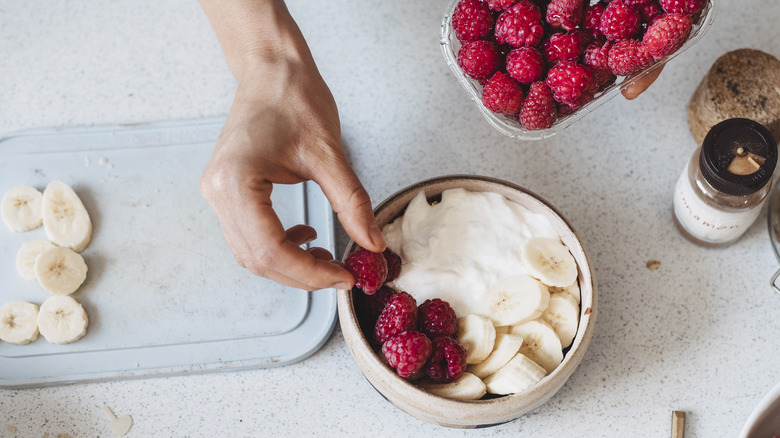
Fruit and yogurt go hand-in-hand, like peanut butter and jelly or apples and cinnamon. There are plenty sorts of fruit-infused yogurts, but you can easily make the same delight at home. Mixing in fresh fruit such as blueberries will give it a stunning blue-purple hue, a light sweetness, and a nice pop with each bite. Sliced strawberries, bananas, or kiwis also make colorful additions. If you have the extra time to blend or purée the fruit, it’ll result in a smooth yogurt.
In addition to whole or chopped fruits and fruit purée, you can use fruit jam. This is an easy option since you don’t have to wash, chop, or blend, as you would for fresh or puréed fruit. Kids wary of yogurt would appreciate a sweetened yogurt that is a replica of store-bought versions. It’s also a fantastic way to use the last bits in a jam jar when there’s not a lot left. Pour your yogurt into the near-empty jar, and shake or mix it up to integrate the jam with the yogurt.
8. Spoon sweet sauces into yogurt
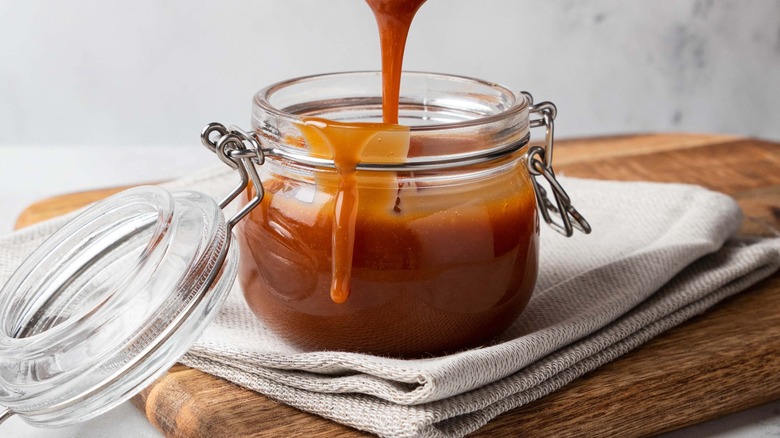
Stir some sweetness and flavor into your plain yogurt with sweet sauces, such as butterscotch, hot fudge, caramel, or toffee. Many brands sell their own versions, so there are plenty of sauces to select. It turns your yogurt into a full-fledged dessert with little effort. You can choose to stir it in, drizzle it on top, or thoroughly incorporate it for an evenly distributed taste. The tartness of the yogurt and the sweetness of the sauces pair together for a bright and balanced flavor composition.
You can even play with temperatures, such as freezing toffee yogurt and eating it like a mini ice cream bar or warming up hot fudge sauce to create a warm and cool yogurt. To further elevate the yogurt, sprinkle some coarse sea salt over the caramel or butterscotch yogurt for a salted caramel dessert. The enhanced yogurt can also be used as the base of a dessert. Rather than an ice cream sandwich, make a yogurt cookie sandwich by sandwiching frozen butterscotch yogurt between two chocolate chip cookies.
9. Transform yogurt with an egg and sugar

This viral yogurt toast idea transforms a standard yogurt into a total treat. This custard-like mixture blends yogurt with an egg and sugar that gets spread on bread and then baked in the oven. The egg cooks with the yogurt to give it a firm texture that’s similar to custard, while the sugar caramelizes it. You can add a dash of sugar or honey for a nuanced sweetness or a sprinkle of cinnamon or vanilla for extra deliciousness.
Try a spoonful of mascarpone cheese for a mouthwatering richness that brings out the custard taste. Top the toast with fresh fruit or a dollop of homemade whipped cream. This surprising combination is particularly alluring thanks to its ease of making and doesn’t involve any tempering. Use plain white bread to act as a neutral canvas, a baguette for a crunchy version, or sourdough to complement the tang of the yogurt. Get a bite of dessert in the morning with a silky and creamy custard on a crunchy piece of toast.
10. Bust out the botanicals
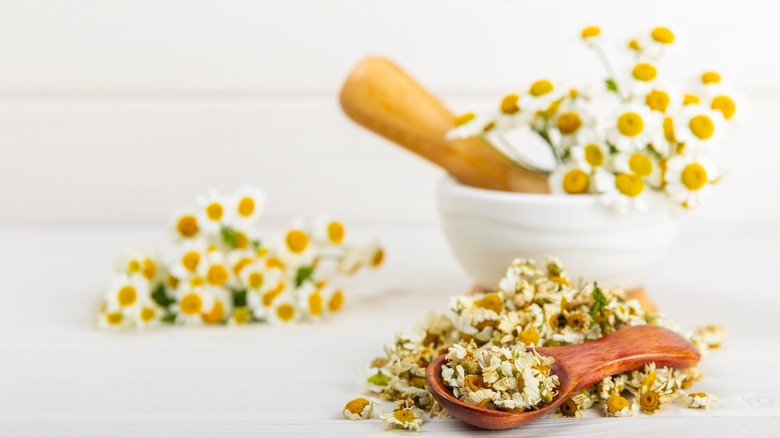
Edible flowers and botanical infusions can mold your yogurt into a sophisticated snack. Store-bought yogurt comes in a range of unexpected flavors, such as berries with chamomile, mango orange blossom, strawberry hibiscus, and more. While these aren’t your standard flavors, they might be appealing to you. Replicate these at home with edible flowers, tea infusions, syrups, and whatever else you can find.
You could integrate edible flowers in a couple of ways. Create a strong infusion by steeping it like you would for tea, putting the flowers or a tea bag in a small amount of hot water. Let it steep until the water cools down, then pour it into the yogurt. Start with a small amount of liquid and mix; repeat this step until you get the consistency you want. This offers a smooth texture and gentle botanical flavor. Another way to do it is to crush or blitz the florals in a food processor or mortar and pestle before combining them into the yogurt. This method will give the yogurt some texture.
Try it with apple blossoms, chamomile, calendula, elderberry, lavender, or hibiscus, and then branch out to other edible flowers once you’re familiar with the technique. If you’re not sure where to begin, chamomile has a floral element that’s not too overpowering. For something more prominent, use lavender in your yogurt.
11. Elevate yogurt with nut butter
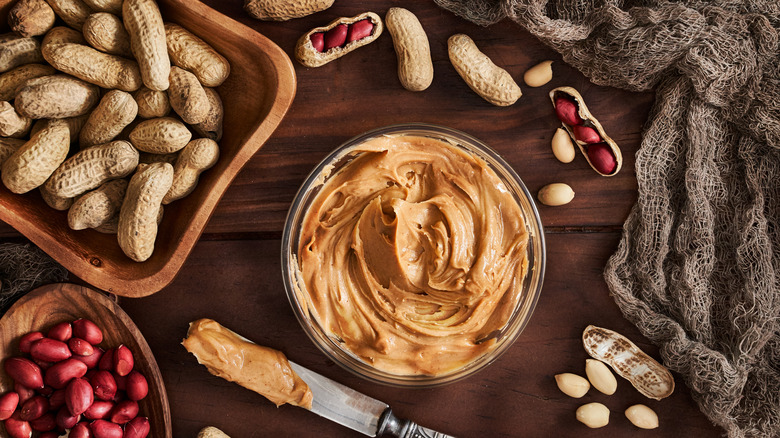
A common pantry staple, nut butter can offer a nice contrast to a tart yogurt. Though peanut butter, which you probably have in your home, comes to mind, almond butter and other nut butter variations are becoming increasingly popular and widely available. From the gorgeous green pistachio butter to rich macadamia butter, many kinds of nut butter on the market were likely not available years ago unless you made it yourself. Now, there are endless options, like pecan butter, cashew butter, walnut butter, and more.
Any of these blended nut butters will make a creamy addition and rich flavor that offsets any acidity or sharpness in your yogurt. The blend of fat and protein enhances your morning yogurt into a more filling version. Mix and match nut butter for depth, or stick with your favorite. This works with any variety of nut butter, as well as any consistency, from smooth to crunchy.
12. Have fun with the yogurt toppings

Another alternative to plain yogurt is to get creative with the toppings. Many yogurt brands have captivating flavors that you can mimic at home. No need to pay a few bucks for a small one-serving flavored yogurt when you can create some yummy concoctions from your own cabinet. Just open your pantry, and you’ll probably find a few goodies to toss onto your yogurt. For something sweet, try chocolate chips, crushed cookies, graham crackers, brownie bits, or granola.
Think of it like a frozen yogurt station with its rainbow of toppings. You can do the same thing with your yogurt — and it doesn’t always have to be sweet. To possibly include nutritional variety, go for chia seeds, nuts, pumpkin seeds, or coconut flakes. Turn the yogurt savory with olives, cooked grains like quinoa or farro, or bagel seasoning. Whether you have that last piece of brownie leftover or some chia seeds hidden in the back of your pantry, you can integrate them into your yogurt as a topping.
13. Stir powder into yogurt
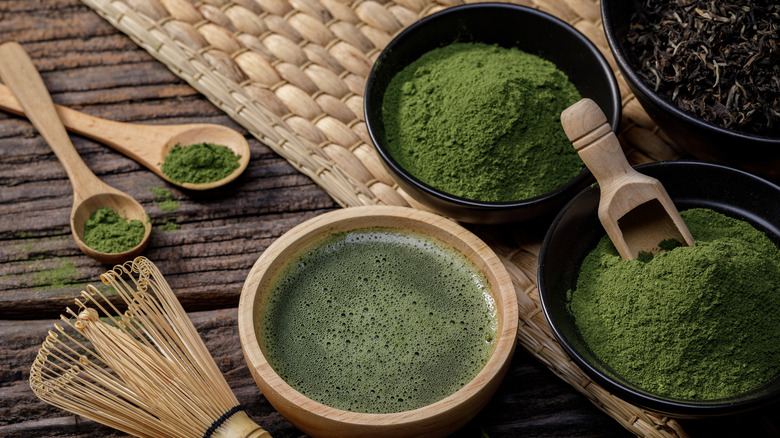
As we established earlier, yogurt has a range of vitamins and minerals to help fuel your body. Pair this dairy powerhouse with a formidable powder, such as cocoa, spirulina, matcha, maca, or protein powder. Incorporating powders can upgrade the flavor while also amplifying the potential nutritional benefits. As long as you make sure to thoroughly mix it into the yogurt, the powder won’t mess up the texture since it’s finely ground.
Matcha has a green tea taste, a boost of caffeine, and a beautiful color that would go deliciously with a few drops of maple syrup. Protein powder not only increases the protein but acts as a neutral base when it’s unflavored or as an enhancer with the flavored variety. There is a range of protein powder flavors out there, from strawberry shortcake to chocolate. Cocoa powder would go well a vanilla yogurt, so you’re not left with an earthy taste of cocoa powder. Spirulina has a stunning green tint and a marine taste, so you’ll want to use a sweetened yogurt or add a sweetener yourself.
14. Find inspiration from other cultures

From raita to tzatziki, many traditional recipes from different cultures incorporate yogurt to create masterpieces that range from sweet to cooling to savory. Gather inspiration and ingredients from around the world and channel them into tasty ways to use yogurt, be it condiments or dips served with meat, such as gyros with tzatziki.
Consider making the satisfying Turkish toyga soup, which mainly consists of yogurt, wheat berries, chickpeas, and herbs. Or transform your yogurt into the cooling beverage mango lassi by blending yogurt, milk, mango pieces, cardamom powder, honey, and a squeeze of fresh lime juice. You could also make a refreshing raita to pair with Madras curry or biryani. In Persian culture, plain yogurt is often served on the side with something like kabob and rice, so you don’t necessarily have to add a bunch of ingredients to your yogurt. There’s even doogh, which is a carbonated yogurt drink.
15. Drop in some extracts

Vera Prokhorova/Shutterstock
Bust out those little containers of extracts from your pantry as an interesting way to add more flavor to yogurt. They can elevate the flavor components without distorting the texture, and you don’t have to use much since they’re potent.
Hazelnut or almond extract provides a fragrant nuttiness that partners well with vanilla or sweetened yogurt, whereas peppermint extract has a refreshing component. Squeeze a few drops of it into your yogurt, and then add some mini chocolate chips for a mint chip ice cream-inspired yogurt. Coffee extract is perfect for a morning pick-me-up that’s not your average cup of joe. Another breakfast combination is lemon extract, yogurt, and poppy seeds for a lemon poppyseed taste.
Don’t be afraid to use more than one extract, either. Blending extracts like vanilla and hazelnut or coconut and coffee just might pleasantly surprise you. As long as the flavors work together, you could do flavored yogurts with extracts, such as lemon extract with berry yogurt, too. A little goes a long way with extracts, so you don’t have to use much to kick up your yogurt.



